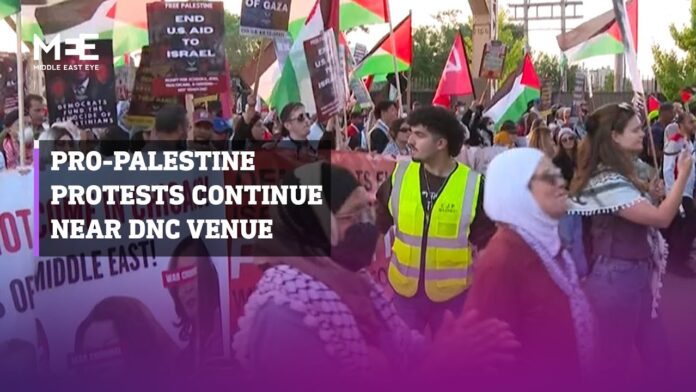Uncommitted delegates protest outside the Democratic National Convention, demanding a Palestinian voice be heard, but face rejection from the party leadership
The Democratic National Convention in Chicago faced controversy as uncommitted delegates protested the party’s refusal to grant a Palestinian speaker a slot at the event. The delegates, who oppose U.S. support for Israel in its ongoing conflict with Gaza, initiated a sit-in outside the convention arena on Wednesday night. The protest persisted through Thursday as activists awaited a response from Vice President Kamala Harris’s campaign, which had been given a deadline of 6:00 p.m. local time to address the issue.
The protesters, part of a movement advocating for a more critical stance on U.S. support for Israel, had hoped to hear from a Palestinian representative regarding the Gaza situation. Despite their efforts, the Harris campaign did not accede to their request. Activists lamented that their demands, which were made well in advance of the convention, had been ignored.
The sit-in and the accompanying demonstrations, which drew thousands of protesters advocating for a ceasefire and more robust policies on Gaza, remained largely peaceful. However, a separate, unsanctioned protest outside the Israeli consulate resulted in 56 arrests.
Layla Elabed, a co-leader of the uncommitted delegates, criticized the Democratic leadership’s decision, calling it a “disastrous” refusal of a reasonable request. The Harris campaign, represented by spokespersons, acknowledged discussions with the movement’s leaders but did not offer a speaking slot. Instead, they emphasized that several speakers had already addressed the Gaza conflict and the need for a ceasefire.
Uncommitted delegates, who were selected in Democratic primaries earlier this year, represent a faction of the party dissatisfied with the current stance on Israel. Despite President Joe Biden’s overwhelming primary victories, pro-Palestinian activists influenced a notable number of voters to choose “uncommitted,” resulting in 30 delegates at the convention out of over 2,400.
The Gaza conflict, a divisive issue within the Democratic Party, was scarcely discussed during the convention. Activists had submitted a list of potential Palestinian speakers to the Harris campaign but were told that the focus was on the Vice President’s upcoming speech. Abbas Alawieh, an uncommitted delegate from Michigan, expressed frustration and anticipated challenging discussions with the Harris team following the convention.
Representative Ilhan Omar, a vocal critic of U.S. support for Israel, noted the lack of foreign policy focus at the convention. She remarked on the broader issue of how foreign policy is often overshadowed by domestic concerns at such events, though she considers it integral to domestic policy.
Analysis:
Political:
The rejection of the Palestinian speaker request highlights the Democratic Party’s internal divisions over its stance on the Israel-Gaza conflict. The uncommitted delegates’ protest underscores the growing tension within the party between traditional supporters of Israel and those advocating for Palestinian rights. This conflict could influence party dynamics and future policy decisions, especially as the 2024 election approaches. The Democrats’ handling of this issue may impact their broader electoral strategy, particularly among progressive voters who prioritize human rights and international diplomacy.
Social:
The protests reflect a broader societal debate on U.S. foreign policy and its impact on international conflicts. The demand for a Palestinian voice at the convention represents a growing call for inclusion and recognition of Palestinian perspectives in American political discourse. This protest signals an increasing push from social movements to hold political parties accountable for their foreign policy stances and to amplify marginalized voices in mainstream platforms.
Racial:
While the protest was not explicitly racial, the broader implications of the Gaza conflict often intersect with discussions on race and ethnicity. The debate over Palestinian representation touches on issues of racial and ethnic justice, as Palestinians and other marginalized groups seek greater visibility and representation in international and domestic policy discussions. The exclusion of Palestinian voices can be seen as part of a larger pattern of racial and ethnic marginalization in global and national politics.
Gender:
Gender dynamics are less prominent in this specific protest, but the involvement of female activists like Layla Elabed highlights the role of women in advocacy and political activism. Women often lead grassroots movements and contribute significantly to shaping political discourse on issues of human rights and international justice. Their leadership in this protest underscores the critical role women play in driving change and challenging established political norms.
Economic:
The economic impact of the Gaza conflict and U.S. foreign policy decisions extends to various sectors, including defense, humanitarian aid, and international relations. The Democratic Party’s stance on the conflict could influence economic decisions related to military aid, trade, and diplomatic relations. The internal party conflict over this issue reflects broader economic implications, as policy decisions affect both domestic and international economic strategies.
